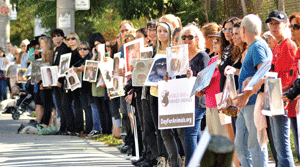Dennis Hanagan —
When King West resident Sylvia Fraser sees “vulnerable, shivering, innocent” pigs through the slats in livestock trucks entering Quality Meat Packers on Wellington St. W. it makes her think of child abuse, too.
“I’m here because of compassion,” the book author said Sept. 29 as she joined more than 100 peaceful protesters holding anti-meat signs on the sidewalk outside the slaughterhouse.
peaceful protesters holding anti-meat signs on the sidewalk outside the slaughterhouse.
They were marking the 30th annual World Day for Farmed Animals with activists from Toronto Pig Save and U.S.-based non-profit Farm Animal Rights Movement. Nearby, a video ran showing the suffering animals undergo as they’re processed for meat.
A 16-page pamphlet showed live baby male chicks tossed into grinders, injured birds clubbed to death, piglets castrated without anesthesia, and conscious cows hung upside down to bleed to death.
“We feel there is an enormous amount of denial about how our meat is produced,” said Fraser who’s vegetarian and struggling to become vegan.
Having researched the topic, Fraser said factory farming, part of the meat-producing industry, is unsustainable with 70 per cent of the world’s fresh water being used by factory farms, and 77 per cent of U.S. pharmaceuticals being used to make animals grow fat—the latter she described as “a huge bomb in the future.”
“Saving animals is also saving the planet,” she said.
Anita Krajnc of Bathurst Quay and an organizer with Toronto Pig Save said 65 billion land animals and 100 billion fish are killed for food each year.
“Each animal has its own personality, has feelings, wants to live, and fears death. They die horrible, miserable deaths at slaughter houses.” Advocating veganism, she said nutritionists endorse eating more fruits, vegetables and legumes as a healthier diet.
Animal rights activists are also pro-worker, she said, and want slaughterhouse workers trained and given jobs alternative to the slaughter business.
“I think this (trasnsition) is going to happen in my lifetime. I think we’re going to have a major shift toward a non-vilolent, vegan economy.”
 TheBulletin.ca Journal of Downtown Toronto
TheBulletin.ca Journal of Downtown Toronto

